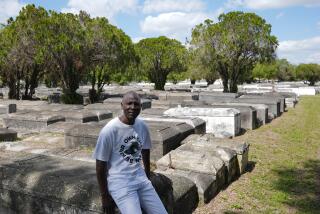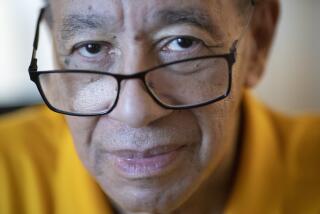90-Year-old Woman Denied Benefits Because of Her Oak Coffin’s Value
- Share via
JUNEAU, Alaska — Altona Brown, a 90-year-old hunter, fisherman and trapper, may die in debt because the U.S. government didn’t consider the coffin she bought to be a “burial receptacle.”
The government decided that the $2,946 oak box was a profitable asset--like a house or a car--and until she sold it, officials denied her a $30-a-month Supplemental Social Security income and Medicaid benefits.
The government even wanted Brown, an Athabaskan Indian, to sell the beaded moccasins, skin mittens and braided rugs she made to give away as part of a native burial custom, said B. Jarvi, her court-appointed conservator.
Brown kept her coffin. But without her Medicaid benefits, she rang up $60,000 debt at the Denali Nursing Center in Fairbanks where she lives because she is legally blind. Her care costs about $8,000 a month.
“This is a classic example of bureaucracy gone nuts,” said Jarvi, a professional conservator who has been fighting the government on Brown’s behalf since December, 1993. She waived all fees to handle Brown’s case.
A Fairbanks newspaper columnist first detailed Brown’s plight in August, and a public outcry followed. People called to offer help or pay for the coffin.
Alaska’s congressional delegation stepped in and the Social Security office acknowledged that the coffin was a “burial receptacle,” said Linda Shafer, assistant to U.S. Sen. Frank Murkowski (R-Alaska).
Brown was allowed to keep her coffin and qualify for the benefits but then Uncle Sam said the coffin wasn’t the problem.
The native elder also set aside $740 for a charter plane to fly her remains to her home village of Ruby on the banks of the Yukon River.
When an elder dies, the tribe holds a ceremony where stories are told about the deceased’s life. It’s at that potlatch that gifts are bestowed--in Brown’s case, the moccasins, mittens and rugs the government wanted to sell.
The ticket and the casket pushed Brown over the $1,500 burial exemption limit allowed by Social Security officials, Jarvi said. The conservator, however, was able to persuade federal officials that the cost was acceptable because of her Indian heritage.
Charles Balasko, manager of the Fairbanks Social Security office, said privacy laws bar him from even acknowledging that Brown’s case exits.
He said “it might sound coldhearted,” but his office has a strict set of rules and laws and sometimes workers have to set aside their personal feelings about a case.
“We are not sitting here as fat bureaucrats making decisions willy-nilly that affect people’s lives. We have to make interpretations based on the law as we see it,” he added. “Sometimes we make mistakes.”
The government has agreed to restore Brown’s benefits and pay for all but two months in back bills, Jarvi said. That leaves Brown responsible for about $18,000.
Brown’s 50 years of wilderness work does not make her eligible for regular Social Security. Her $30-a-month Supplemental Social Security and other monthly income, about $300, is applied to the debt, Jarvi said.
Shafer and Jarvi contend that if the Social Security office dealt with the problem when Brown first applied for benefits in 1993, the $18,000 might not be an issue.
“But they force you to jump in and sit on their chest before they’ll even listen to you,” Shafer said. “It was ridiculous.”
More to Read
Sign up for Essential California
The most important California stories and recommendations in your inbox every morning.
You may occasionally receive promotional content from the Los Angeles Times.










